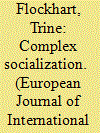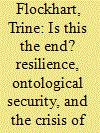|
|
|
Sort Order |
|
|
|
Items / Page
|
|
|
|
|
|
|
| Srl | Item |
| 1 |
ID:
069083


|
|
|
| 2 |
ID:
184482


|
|
|
|
|
| Summary/Abstract |
The concept ‘Westlessness’ suggests that the liberal international order (LIO) is in crisis because there is today ‘less West’ in the world, and the West is itself becoming less Western. The article asks if, and if so how, the LIO can remain resilient and salient in the face of growing ‘Westlessness’ and contestations against the liberal order’s values and institutions. It suggests that the big challenges will be for the LIO to adapt to give the order a broader appeal than is currently the case, whilst doing so without losing what is understood to be the essence of the LIO. The article suggests that this may be possible through a focus on visions for the good life as ‘trading zones’ in which dissimilar groups can find common ground whilst simultaneously disagreeing on their general outlook. However, the approach necessitates acceptance that perhaps the LIO has for too long been characterised by ‘Westfulness’ and that ‘less West’ in the world could be a step towards a more inclusive international order with space for different visions for the good life.
|
|
|
|
|
|
|
|
|
|
|
|
|
|
|
|
| 3 |
ID:
171158


|
|
|
|
|
| Summary/Abstract |
The liberal international order is widely believed to be resilient because it has always had a remarkable ability to adapt in response to crisis and adversity. Today, the liberal order is clearly in crisis, and yet decisive action to adapt it is not taking place. Using insights from the resilience-thinking literature supplemented with insights from the literature on ontological security, the article seeks to understand why agents often fail to take decisive adaptive action, even when such action is clearly needed. The article develops a conceptual framework, including agent-level theorizing, to better understand agent motivation for undertaking adaptive action and a conception of the social site for resilience as an ideal-type social domain in which resilience is constituted and defined in the interaction between patterns of power, principles, and practice. The article contributes to resilience-thinking by demonstrating a plausible link between agents’ ability to invoke their agency and their ontological security.
|
|
|
|
|
|
|
|
|
|
|
|
|
|
|
|
| 4 |
ID:
054252


|
|
|
| 5 |
ID:
123562


|
|
|
|
|
| Publication |
2013.
|
| Summary/Abstract |
The article argues that NATO is a nuclear-addicted alliance. It focuses on how the addiction developed, the damage caused by the addiction and ways in which it may be overcome. After outlining the origins to NATO's nuclear addiction, the article turns to the recent defence and deterrence posture review (DDPR), which is seen as a classic example of 'addict behaviour' spoiling the best chance NATO has had for overcoming its addiction. The article offers an assessment of the DDPR, portraying the outcome of the process as not only a lost opportunity, but unfortunately also as a position that limits the possibilities for reaching a constructive agreement on the important question of the remaining non-strategic nuclear weapons based in Europe. The article ends by suggesting 12 steps for NATO to overcome its addiction, although it is acknowledged that the DDPR has severely restricted NATO's room for maneuver leaving only a slim chance for 'complete recovery'.
|
|
|
|
|
|
|
|
|
|
|
|
|
|
|
|
| 6 |
ID:
144437


|
|
|
|
|
| Summary/Abstract |
The article shows that the current international system is changing towards a completely new form of international system, conceptualized as a multi-order system. The suggestion for a multi-order world stands in contrast to three current narratives about the future global order expressed through a multipolar narrative; a multi-partner narrative and a multi-culture narrative. The article demonstrates that although each narrative points to a plausible future, neither fully captures what lies ahead. Using English School concepts such as order, international society, international system and primary and secondary institutions, the article reveals a conception of the coming international system as a system consisting of several different ‘orders’ (or international societies) nested within an overall international system. In the coming ‘multi-order world’, the liberal order will continue, and may even be strengthened internally, but its global reach will be a thing of the past. Moreover, the challenge in a multi-order world will be to forge new forms of relationships between composite and diverse actors across complex lines of division and convergence. Scholars and policy-makers should note that the coming multi-order world will be radically different, requiring new thinking and new institutions and the acceptance of diversity in both power and principle.
|
|
|
|
|
|
|
|
|
|
|
|
|
|
|
|
| 7 |
ID:
148785


|
|
|
|
|
| Summary/Abstract |
Constructivism has a problem in accounting for agent-led change and for what motivates agents to make up their minds about how to put their agency to use. I show that constructivism’s problem of change is related to tensions between constructivism’s own key assumptions about the mutually constitutive relationship between structure and agency, understanding of change and to an essentialist conception of identity. I argue that agency is constituted through processes of ‘identification’ involving identity and narrative constructions and performance through practice and action. I make the perhaps controversial move to regard ontological security as a precondition for agent-led change and to identify ontological security maximisation as functionally equivalent to rationalist theories’ agent assumption of utility maximisation. I identify two strategies for maximising ontological security: a ‘strategy of being’ to secure a stable and esteem-enhancing identity and a strong narrative; and a ‘strategy of doing’ to ensure cognitive consistency through routinised practice whilst also undertaking action contributing to a sense of integrity and pride. The article concludes that although humans are endowed with agency, their actual ability to utilise their agency is severely constrained by their need for maintaining ontological security, which may explain why change appears so difficult to achieve.
|
|
|
|
|
|
|
|
|
|
|
|
|
|
|
|
| 8 |
ID:
145507


|
|
|
| 9 |
ID:
171155


|
|
|
|
|
| Summary/Abstract |
The article introduces the special issue by exploring the full potential of “resilience” as a governing regime of the European Union and other international institutions. Developing a more comprehensive understanding of the concept is important for three reasons. One, it gives an opportunity to see resilience not only as a quality of a system, but also as a way of thinking, and a process inherent to “the local” that cannot be externally engineered. Two, as an analytic of governance, resilience challenges the current fundamentals of top-down global governance and refocuses it on the role of “the local” and “the person” to make it more responsive to people’s needs. Three, resilience cannot be understood without exploring where and how it is constituted—that is, without unpacking “the local” ordering domain to see how ontological insecurity and a sense of “good life” could contribute to the emergence of more adaptive governing systems.
|
|
|
|
|
|
|
|
|
|
|
|
|
|
|
|
| 10 |
ID:
075327


|
|
|
|
|
| Publication |
2006.
|
| Summary/Abstract |
The article investigates the claim made by the Bush Administration that the successful democracy promotion in post-war Germany indicates that a similar exercise can be undertaken in present day Iraq with a positive outcome. By conceptualizing both democratization processes as identity constructions, where a democratic norm set is transferred through state socialization, it is argued that although compelling similarities exist between the two cases, important differences are also at work, which indicate less beneficial conditions for democracy in Iraq than in post-war Germany. The article utilizes a social constructivist framework, which indicates that the main determining factor for successful socialization is positive self- and other categorization processes between socializer and socializee Unfortunately events in Iraq such as Abu Gharaib and the appalling security situation may well have a negative effect on these self- and other categorization processes between Americans and Iraqis.
|
|
|
|
|
|
|
|
|
|
|
|
|
|
|
|
| 11 |
ID:
110204


|
|
|
|
|
| Publication |
2012.
|
| Summary/Abstract |
The article contributes to the growing theoretical scholarship on NATO by developing a theoretical framework that demonstrates the complex relationship between doing and being, identity and action, and knowledge and practice. The article addresses the puzzle that NATO in the past decade has been busier than ever, yet has not managed to construct a strong narrative and maintain ontological security. The article presents a framework, which assumes that ontological security is influenced by identity and narrative construction processes, which are themselves reinforced or undermined by practical action, conceptualized as 'functional action' and 'rhetorical action'. By analyzing NATO's current and past narratives, practices, and action patterns, the article shows that NATO's recent crisis is not just a deeper and more serious crisis because Afghanistan is a difficult mission, but that the depth of the crisis is the result of changes in NATO's established practices and new fundamentally different patterns of action.
|
|
|
|
|
|
|
|
|
|
|
|
|
|
|
|
| 12 |
ID:
186557


|
|
|
|
|
| Summary/Abstract |
The global rules-based order has been in transformation for more than a decade, whilst the liberal international order has been in crisis and new international orders are emerging. Within this context, the Russian invasion of Ukraine marks what the Germans have called a Zeitenwende because the multi-order world is now a reality. The article outlines the main characteristics and implications of a multi-order world and outlines four categories of orders that will populate the multi-order world. The article details Putin’s vision for a Eurasian order and how his plans are received within the Eurasian order. The article offers a perspective on how the global dynamics of the new multi-order world might play out, showing that it is likely to be conflictual rather than a cooperative, and that members of the Eurasian order show little enthusiasm for Putin’s vision, resulting in an order held together by force rather than consent.
|
|
|
|
|
|
|
|
|
|
|
|
|
|
|
|
|
|
|
|
|